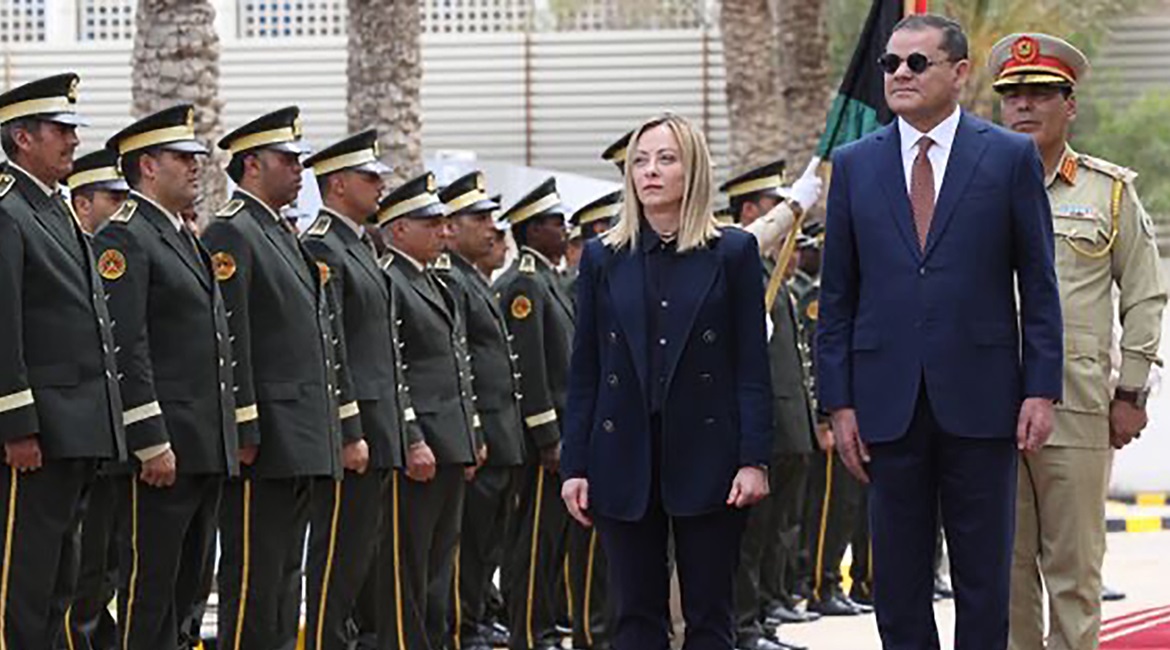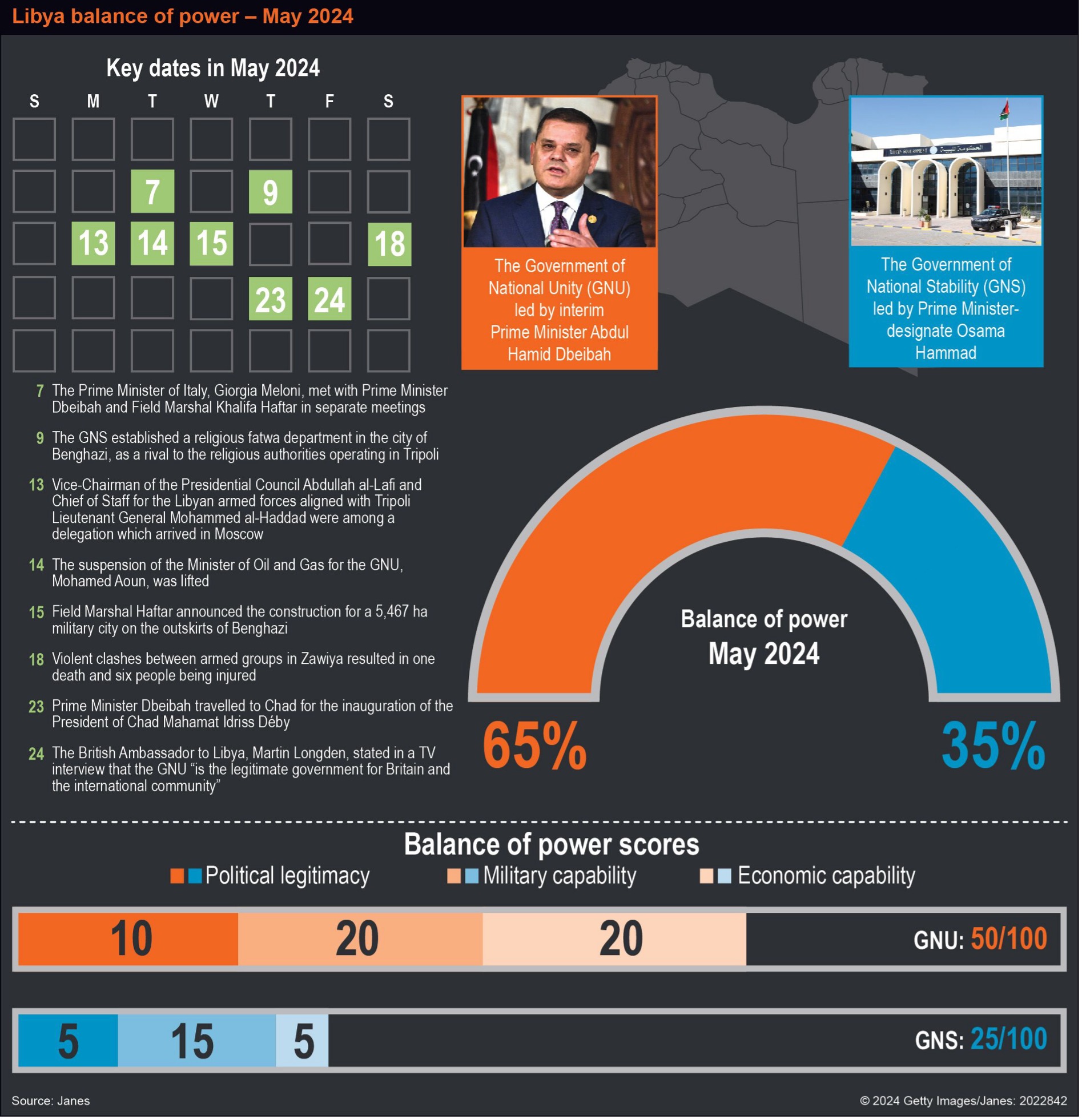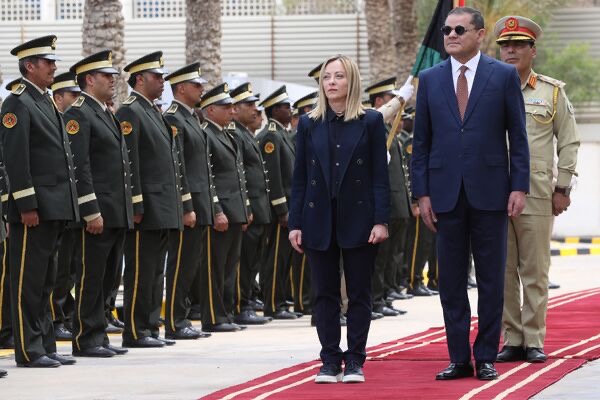
Date Posted: 14-Jun-2024
Author: James Trigg, London
This update is published on behalf of the Janes Country Intelligence (JCIN) Middle East and North Africa (MENA) team. James Trigg reviews the latest developments on the domestic and diplomatic fronts to assess both prospects for a political resolution and risks of renewed conflict in Libya.
Key points
- State visit by Italian premier to Tripoli and Benghazi: Janes assesses that Dbeibah will likely be reassured by Meloni's visit. However, Janes maintains that efforts to encourage the GNU or Haftar and the LNA to separate themselves from the foreign forces that support each faction are unlikely to succeed in the short to medium term
- Belkacem Haftar announces reconstruction initiative: Janes assesses that the LDRF is very likely a vehicle for the expansion of the Haftar family's influence across Libya, especially in Libya's southern Fezzan region. Janes assesses that control of the LDRF provides Belkacem with an opportunity to further establish his political and diplomatic credentials
- GNS establishes religious fatwa department in Benghazi: Janes assesses that the decision to legislate the establishment of a Benghazi-based religious fatwa department was likely in retaliation for statements made by Ghariani in a 24 April 2024 speech. Janes assesses that the presence of two rival offices claiming the position of Libya's highest religious authority will almost certainly transform the office of Grand Mufti into another arena for the settling of political grievances and competition
- LNA to establish ‘military city' west of Benghazi: The investment in such a large project almost certainly demonstrates the entrenchment of the LNA regime in eastern Libya, and particularly around Benghazi. Due to the close association of the LNA with Russian forces operating in Libya, Janes assesses that the construction of this base will likely fuel speculation of eastern Libya hosting Russian forces
- Violent clashes in Zawiya: Janes maintains that further clashes are likely in the short to medium term, undermining the GNU's efforts to re-establish a monopoly on the use of force. Janes also maintains that a ground operation to stabilise Zawiya by the LAF aligned with the GNU is unlikely due to the tenuous progress being made towards reunifying Libya's divided armed forces
 Libya balance of power – May 2024. (Getty Images/Janes)
Libya balance of power – May 2024. (Getty Images/Janes)
Country intelligence assessments
| Assessment and probability | Confidence rating |
|---|---|
| Viable presidential and parliamentary elections will not take place in the short to medium term While a slow consensus has been building among Libya's political elites and international sponsors, progress towards elections will be constrained by the efforts of all parties to influence the electoral process and grant themselves the greatest advantage possible or at least minimise the advantages to their opponents | High |
| Fighters associated with Russian paramilitary groups and troops associated with the Turkish military will almost certainly not leave Libya in the short to medium term Neither the Government of National Unity (GNU) in Tripoli nor the Libyan National Army (LNA) possesses the structures to replace capabilities lost by any withdrawal of the Wagner Group or Turkish forces, nor do they have the desire to unilaterally disarm themselves while the power struggle between Libya's rival political structures continues | High |
Meetings and statements of note
7–24 May: State visit by Italian premier to Tripoli and Benghazi
On 7 May the Prime Minister of Italy, Giorgia Meloni, led a ministerial delegation to Libya. Meloni met first with the interim Prime Minister of the GNU, Abdul Hamid Dbeibah, in Tripoli. According to a 7 May statement released on the website of the Italian government, Meloni reiterated Italian commitment “to work with Libya in all areas of common interest … in particular in the energy and infrastructure sectors”. Furthermore, Meloni and Dbeibah discussed “the importance of holding presidential and parliamentary elections in Libya, within the framework of UN [United Nations] mediation”.
Meloni then travelled to Benghazi, where she met with Field Marshal Khalifa Haftar. According to a 7 May report by the Italian media outlet Agenzia Nova, Meloni and Haftar discussed “the importance of advancing the political process, preserving the unity of Libyan institutions, and of working to end the presence of foreign forces on Libyan soil”.
Meloni's latest visit reflects the complex dynamics that confront foreign politicians and policymakers seeking to engage with Libya. It is notable, for example, that Meloni met with Dbeibah and Haftar, but not the Prime Minister of the House of Representatives (HoR)-appointed Government of National Stability (GNS), Osama Hammad. As Janes noted in Libya balance of power review – January 2023 , Hammad's predecessor, Fathi Bashagha, accused the Italian premier of “visiting a government whose term of power ended” when she previously met with Dbeibah.
Meloni's continuing prioritisation of her relationship with the GNU in Tripoli, while likely recognising Haftar as the de facto authority in eastern Libya, reflects statements made by the British Ambassador to Libya, Martin Longden, to Libya Al-Ahrar TV on 24 May. He stated that “the unity government [referring to the GNU] is the legitimate government for Britain and the international community”. In contrast, Longden warned that “Britain does not recognise the Hammad government because of the authority and management of the armed forces in the east”.

Prime Minister of Italy Giorgia Meloni (left) is met by interim Prime Minister of the GNU Abdul Hamid Dbeibah (right) on 7 May 2024. (Mahmud Turkia/AFP via Getty Images)
Janes assessment
Janes assesses that Dbeibah will likely be reassured by Meloni's visit and Longden's statements. Following the resignation of the former Special Representative of the Secretary-General (SRSG) for Libya, Abdoulaye Bathily, Dbeibah will almost certainly be keen to maintain favourable relations with European politicians to reinforce his government's legitimacy in the face of domestic opposition.
However, Janes maintains that efforts to encourage the GNU or Haftar and the LNA, also known as the Libyan Arab Armed Forces (LAAF), to separate themselves from the foreign forces that support each faction are unlikely to succeed in the short to medium term. As Janes reported in Libya balance of power review – March 2023 , Haftar has previously conditioned his acceptance of Russian paramilitary forces withdrawing from territory belonging to the LNA only if “the forces of Türkiye, deployed in support of the Tripoli government … also leave Libya and … the United States provides support to the LNA”, according to a March 2023 report by Agenzia Nova.
Janes maintains that the GNU and the LNA are both very unlikely to unilaterally deprive themselves of foreign military support, due to the vital capabilities provided. Janes assesses that the arrival of Russian personnel and equipment into Tobruk throughout March and April 2024 will almost certainly enable Haftar and the LNA to continue to operate with considerable independence and agency in the short to medium term. Without enthusiasm from European countries or the US to deploy soldiers into Libya to replace their Russian counterparts, Janes assesses that the continuing Russian presence will almost certainly limit the leverage, which American or European policymakers can bring to bear on the eastern Libyan regime to pursue a negotiated arrangement with Dbeibah and the GNU.
These assessments are made with moderate confidence on the basis of consistent, verifiable, secondary sources, which reflect Dbeibah's and Haftar's respective positions and intentions.






